pun英语双关语集锦.pdf
英语中有趣的双关语
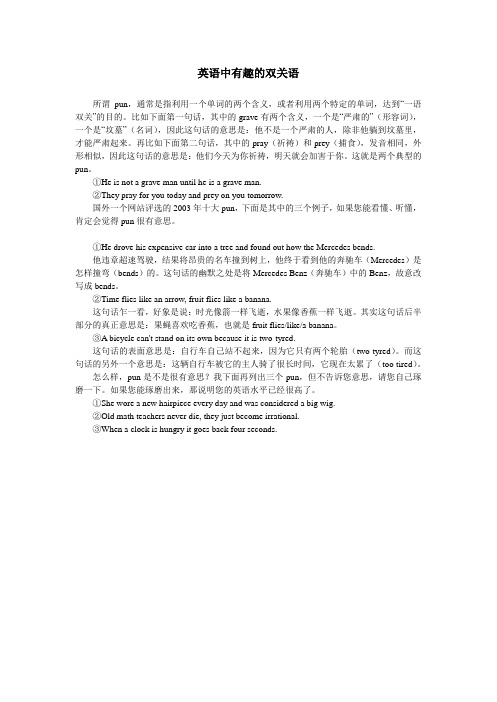
英语中有趣的双关语所谓pun,通常是指利用一个单词的两个含义,或者利用两个特定的单词,达到“一语双关”的目的。
比如下面第一句话,其中的grave有两个含义,一个是“严肃的”(形容词),一个是“坟墓”(名词),因此这句话的意思是:他不是一个严肃的人,除非他躺到坟墓里,才能严肃起来。
再比如下面第二句话,其中的pray(祈祷)和prey(捕食),发音相同,外形相似,因此这句话的意思是:他们今天为你祈祷,明天就会加害于你。
这就是两个典型的pun。
①He is not a grave man until he is a grave man.②They pray for you today and prey on you tomorrow.国外一个网站评选的2003年十大pun,下面是其中的三个例子,如果您能看懂、听懂,肯定会觉得pun很有意思。
①He drove his expensive car into a tree and found out how the Mercedes bends.他违章超速驾驶,结果将昂贵的名车撞到树上,他终于看到他的奔驰车(Mercedes)是怎样撞弯(bends)的。
这句话的幽默之处是将Mercedes Benz(奔驰车)中的Benz,故意改写成bends。
②Time flies like an arrow, fruit flies like a banana.这句话乍一看,好象是说:时光像箭一样飞逝,水果像香蕉一样飞逝。
其实这句话后半部分的真正意思是:果蝇喜欢吃香蕉,也就是fruit flies/like/a banana。
③A bicycle can't stand on its own because it is two-tyred.这句话的表面意思是:自行车自己站不起来,因为它只有两个轮胎(two-tyred)。
而这句话的另外一个意思是:这辆自行车被它的主人骑了很长时间,它现在太累了(too tired)。
有趣的英语双关语Puns

Puns例句:1.On Sunday they pray for you and on Monday prey on you.星期天他们为你祈祷,星期一他们却向你榨取。
2.Seven days without water makes one weak (week).七天不喝水,虚的拉不动腿。
Homonyms ['hɔmənims] :Why is an empty purse always the same?Because there is never any change in it.钱包为什么老是瘪的?因为它里面从来就没有零钱。
Polysemy [,pɔli'si:mi, pə'lisəmi, 'pɔlisi:mi]We eat what we can and what we can’t we can.我们能吃的就吃,不能吃的就做成罐头。
Asteismus岐解双关(asteismus) 即后者在回答前者的话时有意(无意)地曲解原意,造成不同理解,进而形成岐解双关。
1.A professor tapped on his desk and shouted: “Gentlemen ,order!”The entire class yelled “Beer!”一位教授敲着桌子喊道:“先生们,安静!”全班同学异口同声地喊“啤酒”。
双关语的语义范围双关语为世界各国人民所喜爱和使用。
在汉语中,双关语的例证比比皆是。
双关语既可用于故事、笑话、谜语、儿歌等,又可以用于正式场合,表达严肃的思想和深邃的感情。
(一)广告Give your hair a touch of Spring.给你的头发洒满春色,让你的头发富有弹性。
(二)笑话What’s the difference between a soldier and a young girl?One powders the face ,the other faces the powder.一个士兵和一个年轻姑娘的区别是什么?一个往脸上抹粉,一个面对火药。
英语修辞之双关——Pun
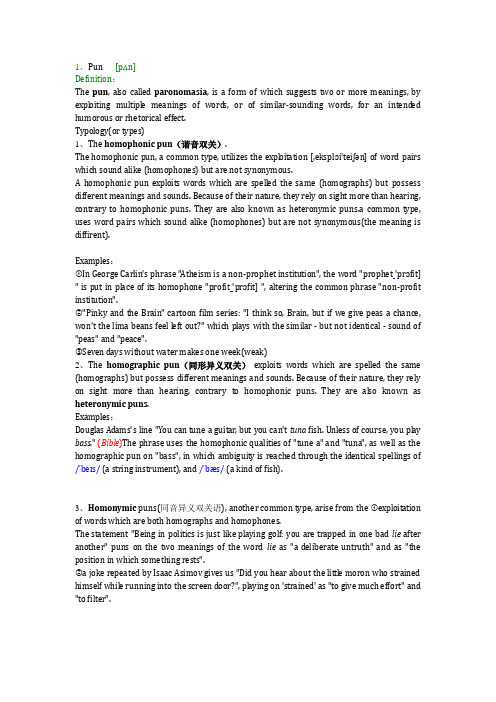
1、Pun[pʌn]Definition:The pun, also called paronomasia, is a form of which suggests two or more meanings, by exploiting multiple meanings of words, or of similar-sounding words, for an intended humorous or rhetorical effect.Typology(or types)1、The homophonic pun(谐音双关).The homophonic pun, a common type, utilizes the exploitation [,eksplɔi'teiʃən] of word pairs which sound alike (homophones) but are not synonymous.A homophonic pun exploits words which are spelled the same (homographs) but possess different meanings and sounds. Because of their nature, they rely on sight more than hearing, contrary to homophonic puns. They are also known as heteronymic puns.a common type, uses word pairs which sound alike (homophones) but are not synonymous(the meaning is diffirent).Examples:①In George Carlin's phrase "Atheism is a non-prophet institution", the word "prophet 'prɔfit] " is put in place of its homophone "profit'prɔfit] ", altering the common phrase "non-profit institution".②"Pinky and the Brain" cartoon film series: "I think so, Brain, but if we give peas a chance, won't the lima beans feel left out?" which plays with the similar - but not identical - sound of "peas" and "peace".③Seven days without water makes one week(weak)2、The homographic pun(同形异义双关)exploits words which are spelled the same (homographs) but possess different meanings and sounds. Because of their nature, they rely on sight more than hearing, contrary to homophonic puns. They are also known as heteronymic puns.Examples:Douglas Adams's line "Y ou can tune a guitar, but you can't tuna fish. Unless of course, you play bass." (Bible)The phrase uses the homophonic qualities of "tune a" and "tuna", as well as the homographic pun on "bass", in which ambiguity is reached through the identical spellings of /ˈbeɪs/ (a string instrument), and /ˈbæs/ (a kind of fish).3、Homonymic puns(同音异义双关语), another common type, arise from the①exploitation of words which are both homographs and homophones.The statement "Being in politics is just like playing golf: you are trapped in one bad lie after another" puns on the two meanings of the word lie as "a deliberate untruth" and as "the position in which something rests".②a joke repeated by Isaac Asimov gives us "Did you hear about the little moron who strained himself while running into the screen door?", playing on 'strained' as "to give much effort" and "to filter".4、compound pun is a statement that contains two or more puns.Examples:①a complex statement by Richard Whately includes four puns: "Why can a man never starve in the Great Desert? Because he can eat the sand which is there. But what brought the sandwiches there? Why, Noah sent Ham, and his descendants mustered and bred."[8]This pun uses "sand which is there/sandwiches there, "Ham/ham", "mustered/mustard", and "bred/bread".5、A recursive pun is one in which the second aspect of a pun relies on the understanding of an element in the first.Examples:① the statement "π is only half a pie." (π radians is 180 degrees, or half a circle, and a pie is a complete circle).②"Infinity(无限大)is not in finity(有限的)," which means infinity is not in finite range.③"A Freudian slip is when you say one thing but mean your mother."[9] Finally, we are given "Immanuel doesn't pun, he Kant(康德)" by Oscar Wilde.6、Visual puns are used in many logos, emblems, insignia, and other graphic symbols, in which one or more of the pun aspects are replaced by a picture. In European heraldry, this technique is called canting arms.Visual and other puns and word games are also common in Dutch gable stones as well as in some cartoons Examples:① Visual and other puns and word games are also common in Dutch gablestones;② In some cartoons such as Lost Consonants and The Far SidePuns in comedies、jokes、literatureIn Romeo and Juliet when Mercutio begs Romeo to dance, Romeo refuses.Unlike Mercutio’s shoes with “nimble soles,” Romeo says that he has a “soul of lead.” At one point, Romeo asks for a torch, saying “being heavy [sad], I will bear the light.”Captain Aubrey: "Do you see those two weevils, Doctor?...Which would you choose?"Dr. Maturin: "Neither. There's not a scrap of difference between them. They're the same species of Curculio."Captain Aubrey: "If you had to choose. If you were forced to make a choice. If there were no other option."Dr. Maturin: "Well, then, if you're going to push me. I would choose the right-hand weevil. It has significant advantage in both length and breadth."Captain Aubrey: "There, I have you!...Do you not know that in the Service, onemust always choose the lesser of two weevils?"Other great works of literature have included puns as well. Poet John Donne, whose name rhymed with “done,” often punned his name in his own poetry. In one of his hymns, he even puns the name of his wife Anne More, with the line “Thou hast not done, For I have more.”Our Bible reveals to us the character of our God with minute andremorseless exactness ... It is perhaps the most damnatorybiography that exists in print anywhere. It makes Nero an angelof light and leading by contrast. [Msark Twain]Falling in love is not at all the most stupid thing that people do —but gravitation can not be held responsible for it. [AlbertEinstein]Prediction is very difficult, especially about the future. [NielsBohr]Essentially, all models are wrong, but some are useful. [George E.P. Box]The best material model of a cat is another, or preferably thesame, cat. [Norbert Wiener]As a child, I received instruction both in the Bible and in theTalmud. I am a Jew, but I am enthralled by the luminous figure ofthe Nazarene. [Albert Einstein]One morning I shot an elephant in my pajamas. How he got intomy pajamas I'll never know. » [Groucho Marx]Puns often are used in the titles of comedic parodies. A parody of a popular song, movie, etc., may be given a title that hints at the title of the work being parodied, substituting some of the words with ones that sound or look similar. Such a title can immediately communicate both that what follows is a parody and also which work is about to be parodied, making any further "setup" (introductory explanation) unnecessary.Examples would include the Star Trek: V oyager episode entitled "False Profits" (a pun on the saying 'false prophets') or the episode of Psych entitled "The Polarizing Express" (spoofing The Polar Express and the definition of polarization, which means 'to break into factions')Non-humorous puns were and are a standard rhetorical and poetic device in English literature. Puns and other forms of word play have been used by many famous writers, such as Alexander Pope, James Joyce, Vladimir Nabokov, Robert Bloch, Lewis Carroll, John Donne, and William Shakespeare, who is estimated to have used over 3,000 puns in his plays.[citation needed]Here is an example from Shakespeare's Richard III:"Now is the winter of our discontent made glorious summer by this son of Y ork"(Son/sun)Shakespeare was also noted for his frequent play with less serious puns, the "quibbles" of the sort that made Samuel Johnson complain, "A quibble is to Shakespeare what luminous vapours are to the traveller! He follows it to all adventures; it is sure to lead him out of his way, sure to engulf him in the mire.It has some malignant power over his mind, and its fascinations areirresistible."[14] Elsewhere, Johnson disparagingly referred to punning as "the lowest form of humour".[citation needed]In the poem A Hymn to God the Father, John Donne, married to Anne More,reportedly puns repeatedly: "Son/sun" in the second quoted line, and twocompound puns on "Donne/done" and "More/more". All three arehomophonic, with the puns on "more" being both homographic andcapitonymic. The ambiguities serve to introduce several possible meanings into the verses."When Thou hast done, Thou hast not done / For I have more.that at my death Thy Son / Shall shine as he shines now, and heretoforeAnd having done that, Thou hast done; / I fear no more."。
pun英语双关语集锦课件.doc
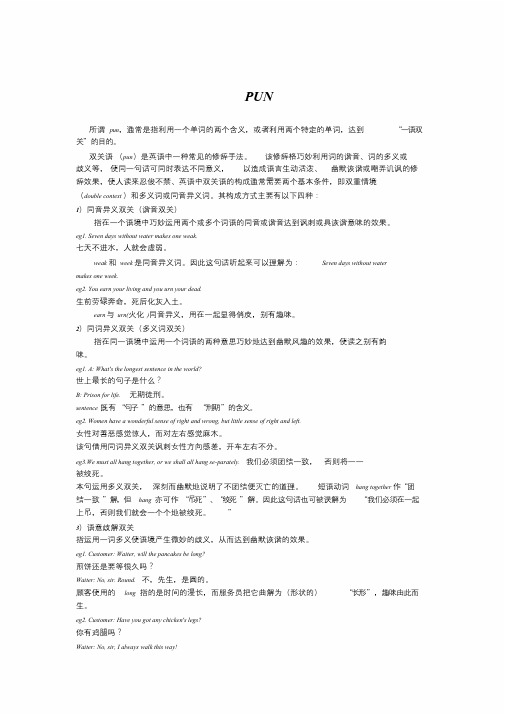
PUN所谓pun,通常是指利用一个单词的两个含义,或者利用两个特定的单词,达到“一语双关”的目的。
双关语(pun)是英语中一种常见的修辞手法。
该修辞格巧妙利用词的谐音、词的多义或歧义等,使同一句话可同时表达不同意义,以造成语言生动活泼、幽默诙谐或嘲弄讥讽的修辞效果,使人读来忍俊不禁、英语中双关语的构成通常需要两个基本条件,即双重情境(double context )和多义词或同音异义词。
其构成方式主要有以下四种:1)同音异义双关(谐音双关)指在一个语境中巧妙运用两个或多个词语的同音或谐音达到讽刺或具诙谐意味的效果。
eg1. Seven days without water makes one weak.七天不进水,人就会虚弱。
weak 和week 是同音异义词。
因此这句话听起来可以理解为:Seven days without watermakes one week.eg2. You earn your living and you urn your dead.生前劳碌奔命,死后化灰入土。
earn 与urn(火化)同音异义,用在一起显得俏皮,别有趣味。
2)同词异义双关(多义词双关)指在同一语境中运用一个词语的两种意思巧妙地达到幽默风趣的效果,使读之别有韵味。
eg1. A: What's the longest sentence in the world?世上最长的句子是什么?B: Prison for life. 无期徒刑。
sentence既有“句子”的意思,也有“刑期”的含义。
eg2. Women have a wonderful sense of right and wrong, but little sense of right and left.女性对善恶感觉惊人,而对左右感觉麻木。
该句借用同词异义双关讽刺女性方向感差,开车左右不分。
eg3.We must all hang together, or we shall all hang se-parately. 我们必须团结一致,否则将一一被绞死。
英语作文范文-英语中的双关词pun

英语作文范文英语中的双关词pun所谓pun,通常是指利用一个单词的两个含义,或者利用两个特定的单词,达到“一语双关”的目的。
例如在下面这句话里,其中的grave有两个含义,一个是“严肃的”(形容词),一个是“坟墓”(名词),因此这句话的意思是:他不是一个严肃的人,除非他躺到坟墓里,才能严肃起来。
再比如下面第二句话,其中的pray(祈祷)和prey(捕食),发音相同,外形相似,因此这句话的意思是:他们今天为你祈祷,明天就会加害于你。
这就是两个典型的pun。
①He is not a grave man until he is a grave man.②They pray for you today and prey on you tomorrow.国外一个网站评选的2003年十大pun,下面是其中的三个例子,如果您能看懂、听懂,肯定会觉得pun很有意思。
①He drove his expensive car into a tree and found out how the Mercedes bends.他违章超速驾驶,结果将昂贵的名车撞到树上,他终于看到他的奔驰车(Mercedes)是怎样撞弯(bends)的。
这句话的幽默之处是将Mercedes Benz(奔驰车)中的Benz,故意改写成bends。
②Time flies like an arrow, fruit flies like abanana.这句话乍一看,好象是说:时光像箭一样飞逝,水果像香蕉一样飞逝。
其实这句话后半部分的真正意思是:果蝇喜欢吃香蕉,也就是fruit flies/like/a banana。
③A bicycle can’t stand on its own because it is two-tyred.这句话的表面意思是:自行车自己站不起来,因为它只有两个轮胎(two-tyred)。
而这句话的另外一个意思是:这辆自行车被它的主人骑了很长时间,它现在太累了(too tired)。
pun英语双关语例子

pun英语双关语例子English puns are a delightful way to play with language, often using homophones or similar-sounding words to create a humorous effect.For instance, "She told me I was average, but I was below par." This pun uses "average" and "below par" to imply that the speaker's performance was not up to standard, while also referencing a golf term.Another example is, "I used to be a baker, but I couldn't make enough dough." Here, "dough" is used in two senses: the money earned and the bread mixture.Consider this one too: "I'm reading a book on anti-gravity. It's impossible to put down." The pun on "put down" suggests both the act of physically lowering a book and the idea of the book being so engaging that it's hard to stop reading.And here's a classic: "I used to be a teacher, but my class was cancelled." The word "class" is a double entendre, referring to both the group of students and the quality of the situation."I'm on a seafood diet. I see food and I eat it." This pun plays on the words "seafood" and "I see food," humorously suggesting a lack of self-control around food."I told my wife she was drawing her eyebrows too high. She looked surprised." Here, "drawing her eyebrows too high" is a pun on the phrase "raising eyebrows," which is used to express surprise.Lastly, "I used to be a sign maker, but I got the sack." The pun on "sack" refers to both a container for carrying items and being fired from a job, creating a humorous twist.。
pun英语双关

---Why are lawyers all uneasy sleepers?
-----Because they lie first on one side and t wide awake all the time.
1) How do you keep cool at a football game? ----Sit next to a fan.
----Why can you never expect a fisherman to be so generous? ----Because his business makes him sell fish.
Pun
B. Homonyms(同形(同音)异义词), i.e., words (or phrase) that have two or more distinctive meanings but have the same sound and spelling. (词义双关)
The use of a word in such a way as to suggest two or more meanings or different associations.
Pun
A. Homophones(同音异义词), i.e., words (or phrases) that have the same or almost the same sound, but different form and meanings
Pun
.-
Why a river is rich? - Because it has two banks.
Pun
We must all hang together, or most assuredly, we shall all hang separately.
Pun 双关语

Pun 双关语1.1Definition:A pun (or paronomasia) is a phrase that deliberately exploits confusion between similar-sounding words for humorous or rhetorical effect.A pun may also cause confusion between two sense s of the same written or spoken word.1.2Three conditions for the construction of pun:1,Double Context (双重情景)2,Hinge(铰链,同音异义词或多义词)3,Trigger(触机,即促成双关语形成的关键因素)“My Faith is gone!” cried he, after one stupefied moment. (Howthorne, Young Goodman Brown)The double context in this example is that on one hand Faith is dying of a serious disease, while on the other hand, the husband believes that God can save his wife. The trigger is that God does not make His power felt and Faith is dead.The hinge is the word “Faith”. With the same pronunciation, it can not only refer to a lady called “Faith” but also the “strong belief” held by the husband. It fits both of the contexts.1.3The major types of pun双关指的是借助语言文字上的同音异义或同形异义现象使一个词语或句子具有两种不同的意思。
谐音双关双关语(pun)指在一定的语言环境中利用词的多义和
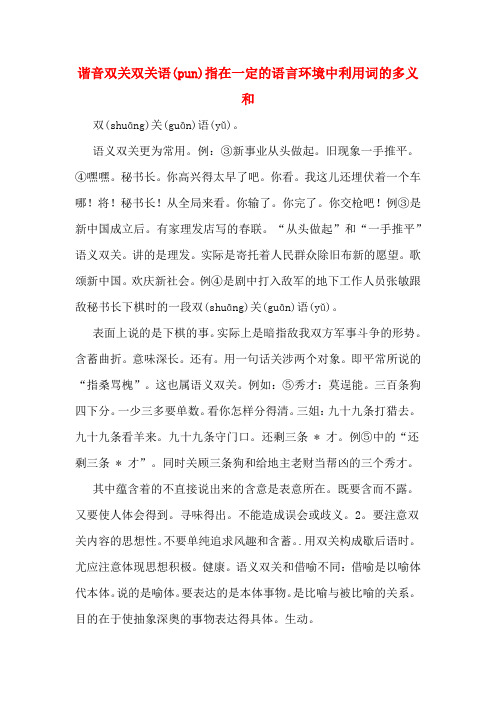
谐音双关双关语(pun)指在一定的语言环境中利用词的多义和双(shuāng)关(guān)语(yǔ)。
语义双关更为常用。
例:③新事业从头做起。
旧现象一手推平。
④嘿嘿。
秘书长。
你高兴得太早了吧。
你看。
我这儿还埋伏着一个车哪!将!秘书长!从全局来看。
你输了。
你完了。
你交枪吧!例③是新中国成立后。
有家理发店写的春联。
“从头做起”和“一手推平”语义双关。
讲的是理发。
实际是寄托着人民群众除旧布新的愿望。
歌颂新中国。
欢庆新社会。
例④是剧中打入敌军的地下工作人员张敏跟敌秘书长下棋时的一段双(shuāng)关(guān)语(yǔ)。
表面上说的是下棋的事。
实际上是暗指敌我双方军事斗争的形势。
含蓄曲折。
意味深长。
还有。
用一句话关涉两个对象。
即平常所说的“指桑骂槐”。
这也属语义双关。
例如:⑤秀才:莫逞能。
三百条狗四下分。
一少三多要单数。
看你怎样分得清。
三姐:九十九条打猎去。
九十九条看羊来。
九十九条守门口。
还剩三条 * 才。
例⑤中的“还剩三条 * 才”。
同时关顾三条狗和给地主老财当帮凶的三个秀才。
其中蕴含着的不直接说出来的含意是表意所在。
既要含而不露。
又要使人体会得到。
寻味得出。
不能造成误会或歧义。
2。
要注意双关内容的思想性。
不要单纯追求风趣和含蓄。
.用双关构成歇后语时。
尤应注意体现思想积极。
健康。
语义双关和借喻不同:借喻是以喻体代本体。
说的是喻体。
要表达的是本体事物。
是比喻与被比喻的关系。
目的在于使抽象深奥的事物表达得具体。
生动。
简洁。
语义双关表达的是两种意思。
借一个词语或句子的意义关顾两个事物。
表里意思不一。
目的在于收到含蓄委婉。
幽默风趣的效果。
语意双关:夜正长。
路也正长。
我不如忘却。
不说的好罢。
由来。
双(shuāng)关(guān)语(yǔ)”就是话中有话。
弦外有声。
暗藏机锋。
隐晦曲折。
需要仔细嚼一嚼。
其味是在细嚼慢咽之中体会的。
有一出川剧叫《秋江》的。
里面的老艄公问前来搭船的女尼贵姓。
妙常故意说“姓陈”。
艄公忙令住口。
93 Pun in English(((英语中的双关语(英语中的双关语
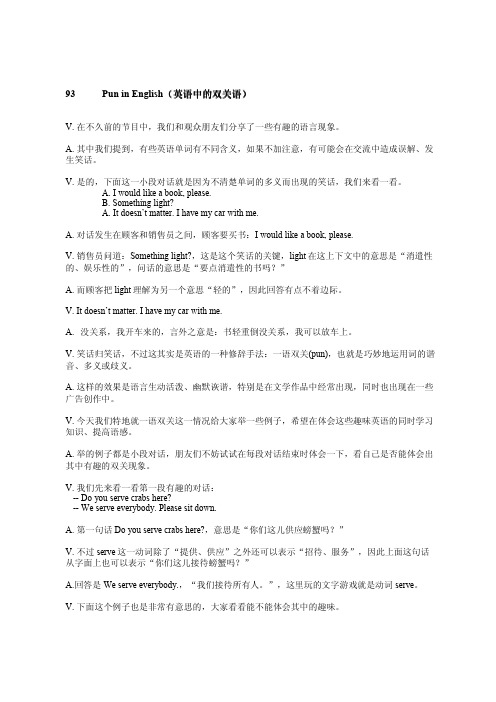
93 Pun in English(英语中的双关语英语中的双关语))V. 在不久前的节目中,我们和观众朋友们分享了一些有趣的语言现象。
A. 其中我们提到,有些英语单词有不同含义,如果不加注意,有可能会在交流中造成误解、发生笑话。
V. 是的,下面这一小段对话就是因为不清楚单词的多义而出现的笑话,我们来看一看。
A. I would like a book, please.B. Something light?A. It doesn’t matter. I have my car with me.A. 对话发生在顾客和销售员之间,顾客要买书:I would like a book, please.V. 销售员问道:Something light?,这是这个笑话的关键,light在这上下文中的意思是“消遣性的、娱乐性的”,问话的意思是“要点消遣性的书吗?”A. 而顾客把light理解为另一个意思“轻的”,因此回答有点不着边际。
V. It doesn’t matter. I have my car with me.A.没关系,我开车来的,言外之意是:书轻重倒没关系,我可以放车上。
V. 笑话归笑话,不过这其实是英语的一种修辞手法:一语双关(pun),也就是巧妙地运用词的谐音、多义或歧义。
A. 这样的效果是语言生动活泼、幽默诙谐,特别是在文学作品中经常出现,同时也出现在一些广告创作中。
V. 今天我们特地就一语双关这一情况给大家举一些例子,希望在体会这些趣味英语的同时学习知识、提高语感。
A. 举的例子都是小段对话,朋友们不妨试试在每段对话结束时体会一下,看自己是否能体会出其中有趣的双关现象。
V. 我们先来看一看第一段有趣的对话:-- Do you serve crabs here?-- We serve everybody. Please sit down.A. 第一句话Do you serve crabs here?,意思是“你们这儿供应螃蟹吗?”V. 不过serve这一动词除了“提供、供应”之外还可以表示“招待、服务”,因此上面这句话从字面上也可以表示“你们这儿接待螃蟹吗?”A.回答是We serve everybody.,“我们接待所有人。
- 1、下载文档前请自行甄别文档内容的完整性,平台不提供额外的编辑、内容补充、找答案等附加服务。
- 2、"仅部分预览"的文档,不可在线预览部分如存在完整性等问题,可反馈申请退款(可完整预览的文档不适用该条件!)。
- 3、如文档侵犯您的权益,请联系客服反馈,我们会尽快为您处理(人工客服工作时间:9:00-18:30)。
PUN所谓pun,通常是指利用一个单词的两个含义,或者利用两个特定的单词,达到“一语双关”的目的。
双关语(pun)是英语中一种常见的修辞手法。
该修辞格巧妙利用词的谐音、词的多义或歧义等,使同一句话可同时表达不同意义,以造成语言生动活泼、幽默诙谐或嘲弄讥讽的修辞效果,使人读来忍俊不禁、英语中双关语的构成通常需要两个基本条件,即双重情境(double context)和多义词或同音异义词。
其构成方式主要有以下四种:1)同音异义双关(谐音双关)指在一个语境中巧妙运用两个或多个词语的同音或谐音达到讽刺或具诙谐意味的效果。
eg1. Seven days without water makes one weak.七天不进水,人就会虚弱。
weak和week是同音异义词。
因此这句话听起来可以理解为:Seven days without water makes one week.eg2. You earn your living and you urn your dead.生前劳碌奔命,死后化灰入土。
earn与urn(火化)同音异义,用在一起显得俏皮,别有趣味。
2)同词异义双关(多义词双关)指在同一语境中运用一个词语的两种意思巧妙地达到幽默风趣的效果,使读之别有韵味。
eg1. A: What's the longest sentence in the world?世上最长的句子是什么?B: Prison for life. 无期徒刑。
sentence既有“句子”的意思,也有“刑期”的含义。
eg2. Women have a wonderful sense of right and wrong, but little sense of right and left.女性对善恶感觉惊人,而对左右感觉麻木。
该句借用同词异义双关讽刺女性方向感差,开车左右不分。
eg3.We must all hang together, or we shall all hang se-parately. 我们必须团结一致,否则将一一被绞死。
本句运用多义双关,深刻而幽默地说明了不团结便灭亡的道理。
短语动词hang together作“团结一致”解,但hang亦可作“吊死”、“绞死”解。
因此这句话也可被误解为“我们必须在一起上吊,否则我们就会一个个地被绞死。
” 3)语意歧解双关指运用一词多义使语境产生微妙的歧义,从而达到幽默诙谐的效果。
eg1. Customer: Waiter, will the pancakes be long?煎饼还是要等很久吗?Waiter: No, sir. Round. 不,先生,是圆的。
顾客使用的long指的是时间的漫长,而服务员把它曲解为(形状的)“长形”,趣味由此而生。
eg2. Customer: Have you got any chicken's legs?你有鸡腿吗?Waiter: No, sir, I always walk this way!不,先生,我一直是这样走路的呀!这个对话表现出顾客同服务员之间的误解。
顾客想吃鸡腿,问服务员是否有这道菜。
服务员误解为顾客嘲笑他像用鸡腿走路的那副样子,于是反驳道:“我一直是这样走路的呀!” eg3.A: Can you see a female? 你能会见一位女士吗?B: Of course, I can see a female as easily as a male. Do you suppose I'm blind?当然可以(看得见),我看女士和看男士是一样地容易。
难道你认为我是个瞎子?第一句话中的see本意是“约见,会见”之意,而B把它歧解为“能看见(have the ability of seeing)”。
4)延伸双关指巧妙运用某些语言现象(构词、发音等),展开联想,临场发挥,适度引申,从而达到某种幽默风趣的效果。
eg1. A: What is the worst kind of fish? 最坏的鱼是什么鱼?B: Selfish. 自私。
selfish(自私)单词碰巧里面含有一个fish。
作者巧妙地运用这一语言现象,答非所问,歪打正着,却意味深远,发人深思,风趣隽永。
eg2.A: Which is the longest word in English?英语中最长的单词是哪一个?B: Smiles, because there is a "mile" between the first letter "S" and the last letter "s".是Smiles,因为从第一个字母S到最后一个字母s,中间相隔一英里(mile)。
回答者把smiles(微笑)拆分成s-mile-s,趣味天成。
现在举几个有趣的英语双关例子:1.-What is the worst weather for mice ?-When it rains cats and dogs.2.-Which can run faster , heat or cold ?- Heat. Because everyone can catch cold.3.-Why is the bride always unlucky on her wedding ?-Because she can never marry the best man.然后,再看看下面这些有趣的问答:1. —Why is a river rich?—Because it has two banks.【提醒】bank有两个意思:一是表示“银行”,二是表示“河岸”。
2. —Why does a man’s hair become grey before his mustaches?—Because a ma n’s mustaches come up after his hair.【提醒】答语句意为:因为人们先长头发后长胡须。
3. —Why is a ship one of the most polite things on earth?—Because it always advances with a bow.【提醒】bow有两个意思是:一是表示“鞠躬”,二是表示“船首”。
4. —Why is your nose in the middle of your face?—Because it is a scenter.【提醒】动词scent 意为“嗅”,其派生名词scenter 意为“嗅的东西”,而scenter刚好与center读音相同5. —Why should fish be well educated?—Because they are so often found in schools.【提醒】school 有两个意思:一是指“学校”,二是指“鱼群”。
6. —Why is the letter A like a flower?—Because the B is after it.【提醒】字母B与bee读音相同。
7. —Why does the letter T look like an island?—Because it is in the middle of “water”.【提醒】答句的字母意思是:因为字母T在单词water的中间。
既然在“水”的中间,当然看起来像是“岛”。
8. —Do you know why birds fly to south in the winter?oo far to walk there.—Because it’s t【提醒】太远不能走着去,当然要飞着去。
9. —Why is a room full of married couples empty?—Because there is not a single man in the room.【提醒】there is not a single man 有两个意思:一是指“没有一个单身未婚男人”,二是表示“没有一个人”。
10. —Why did the student take a ladder to school?—Because he/she was going to high school!【提醒】由于按传统思维,人们一般会将ladder(梯子)与high(高)联系在一起。
11. —Why did the man throw the butter out the window?—He wanted to see the butterfly.【提醒】butterfly 的意思是“蝴蝶”,但若将butterfly分开,则成了butter(黄油)和fly(飞)。
下面有一些例子:1. He is not a grave (adj.严肃的)man until he is a grave (n.坟墓)man.2. They pray(祈祷) for you today and prey (捕食)on you tomorrow.3. He drove his expensive car into a tree and found out how the Mercedes bends.他违章超速驾驶,结果将昂贵的名车撞到树上,他终于看到他的奔驰车(Mercedes)是怎样撞弯(bends)的。
这句话的幽默之处是将Mercedes Benz(奔驰车)中的Benz,故意改写成bends。
4. Time flies like an arrow, fruit flies like a banana.这句话乍一看,好象是说:时光像箭一样飞逝,水果像香蕉一样飞逝。
其实这句话后半部分的真正意思是:果蝇喜欢吃香蕉,也就是fruit flies/like/a banana。
5. A bicycle can't stand on its own because it is two-tyred.这句话的表面意思是:自行车自己站不起来,因为它只有两个轮胎(two-tyred)。
而这句话的另外一个意思是:这辆自行车被它的主人骑了很长时间,它现在太累了(too tired)。
6.She wore a new hairpiece(假发)every day and was considered a big wig(大人物).Wig原意指假发,口语中指要人,大亨7.Old math teachers never die, they just become irrational.老的数学老师永远不会死,他们只是失去理智了(变成无理数)。
